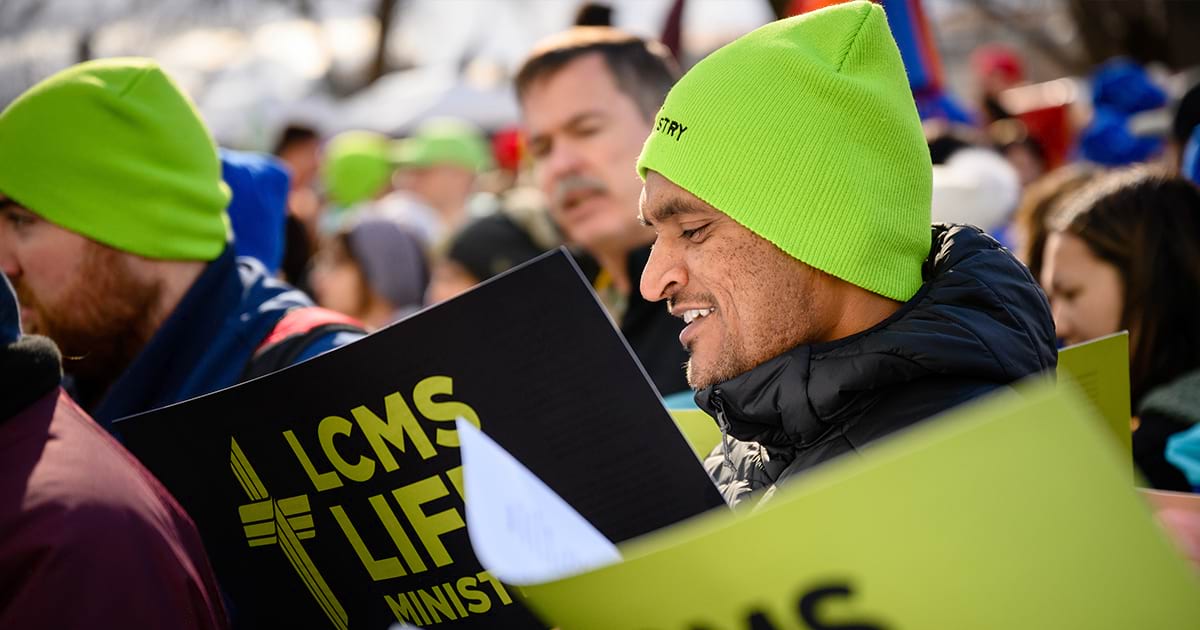
By Kevin Armbrust
“It’s exciting to be here for the first post-Roe March [for Life],” said the Rev. Michael Mohr, president of the LCMS Central Illinois District. “Roe v. Wade was first argued before the court when I was 6 months old.”
Mohr traveled to Washington, D.C., to participate in the 50th annual National March for Life on Jan. 20. “These 50 [years of] marches have not just been about the overturning of that court case. These marches — and now the state … marches that are taking place across the country — are reminders to each and every one of us to fulfill our Christian vocation in caring for the neighbor … in the womb, the neighbor experiencing a surprise pregnancy, the neighbor suffering with sickness or disease, the neighbor afflicted with loneliness or depression, the neighbor experiencing the brokenness of this fallen creation in the ravages of aging,” he said.
The 2023 National March for Life resembled previous marches. Thousands gathered on and around the National Mall in Washington, D.C., with signs and banners proclaiming love for life and the need to protect the unborn. People chanted and played music. Young and old stood side by side. Catholics, Protestants, “Nones” and atheists all joined in to encourage the United States to treasure and protect life.
“It’s very important for us as Christians to stand for unborn children, who have the right to be born. God knew us before we were born. He formed us in our mother’s womb,” said Ashish Bharti — who, with his wife, Kelly Breakall, is receiving catechetical instruction at Our Savior Lutheran Church in Lynchburg, Va. “We came to the march to advocate for unborn life because Jesus died to save people, including the unborn,” added Breakall.
Encouraging local involvement
The LCMS contingent at the march donned lime-green hats as usual. But this year, due to the pleasant weather, many of those hats were ball caps. University students from the Synod’s Concordias marched alongside district presidents. Children and adults walked down Constitution Avenue singing Lutheran hymns. And throughout the march, the people of the LCMS confessed their faith in the Apostles’ Creed and prayed the Lord’s Prayer.
Yet there were some notable differences in this first post-Roe march. “The march was more celebratory,” said the Rev. Christopher Esget, pastor of Immanuel Lutheran Church in Alexandria, Va., and fifth vice-president of the LCMS. “The march’s route was changed. Instead of going straight to the Supreme Court, the march concluded between the Supreme Court and the United States Capitol to demonstrate that the work we need to do now has shifted away from the judiciary to the legislative branch and … [to] passing laws that protect every human being’s right to live.”
LCMS Life Ministry continues to support and participate in the National March for Life but is also working to emphasize local marches. “The issue has been given to the legislature, and there is a great deal of activity currently in the states. We have wonderful life coordinators and volunteers in the districts who work tirelessly to advocate for life locally,” said Deaconess Dr. Tiffany Manor, director of LCMS Life Ministry. “There are local marches happening across the country throughout the year. We encourage the people of the LCMS to be involved locally. Find a march near where you live. Pray for your community. Advocate for life, teach your neighbors about the sanctity of life and serve people as they wrestle with life issues.”
“Sometimes we have let these marches turn our attention to the macro-work being done in these big, grand gestures,” noted Mohr. “In this post-Roe era, our attention is turning to where it needs to be — on the micro-work of our everyday labors of service to those for whom Christ died and alongside those to whom He has sent us to be a neighbor.”
As has become the annual practice, the congregation of Immanuel, Alexandria, hosted a Divine Service prior to the march. “We haven’t come today to the streets of Washington, D.C., for virtue signaling, to simply express a moral opinion or to have the louder voice,” proclaimed the Rev. Noah Rogness, associate pastor of Immanuel, in his homily for the service. “But we have come for confession — to confess … the sin of anger and distrust in one another, the sin of failing to help and support our neighbor in their every need of body and life, [and] the sin of not loving our neighbors as ourselves.”
Rogness continued: “But we have also come to confess the comfort and encouragement of Jesus to the mother who is contemplating an abortion. We have come to confess the forgiveness of Jesus to the father who encouraged an abortion. We have come to confess the peace of Jesus to those who continue to live. We come to confess the life of Jesus to a world in sin because, upon the cross, Jesus Christ defeated death. And now [He] gives to us, His children, His life.”
Esget explained the importance of celebrating the Divine Service to prepare for the march and to place political issues in the proper perspective. “The March for Life is inherently a political activity. It’s not partisan. There are people from all different perspectives there, but it’s my belief this is fundamentally a spiritual issue.
“And before we do anything in the public square, we need to present our petitions before God, to receive His gifts and to remember that it is God who gives life, that it is God who forgives sins, and that we are in the Gospel business.”
Posted March 2, 2023




